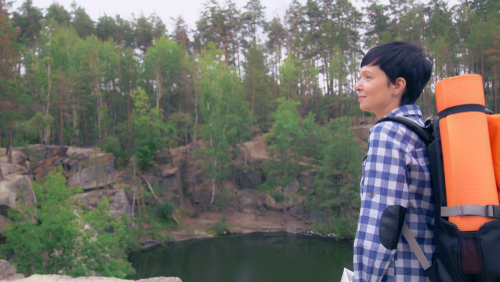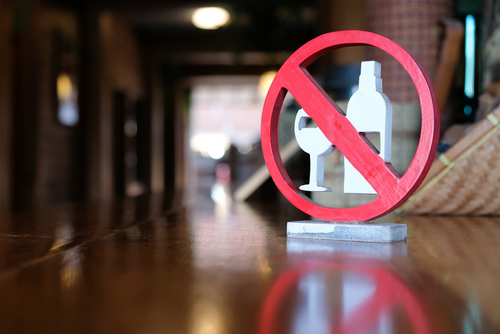In this blog post, you’ll learn the top five ways to challenge the body and mind in sober living to help you stay on the path to sobriety.
Challenging your body and mind in sober living is vital for building a solid foundation in your recovery journey. By pursuing personal growth, individuals in recovery can continue to grow and thrive in their sober living journey.
5 Ways to Challenge The Body & Mind
The journey of sober living is not just about abstaining from substances. It’s about challenging yourself, growing, and finding new ways to thrive. The greatest challenge can often be within ourselves. By facing our fears and doubts, we can overcome them and achieve a fulfilling life in recovery. Incorporating these five activities can help individuals remain focused while promoting overall wellness.

#1 Exercise
Exercise is essential to challenging the body and mind in sober living. Regular physical activity has many benefits for both the mind and body. Exercise is known to reduce stress, anxiety, and depression. It can also improve self-esteem and mood, acting as a natural stimulant. Additionally, exercise can help individuals in recovery to build a new, healthy routine that promotes a sense of accomplishment and purpose.
Many types of exercises can be tried, including cardio, yoga, strength training, and Pilates.
- It’s crucial to find an exercise that you enjoy and that fits into your lifestyle.
- Some exercise alone, while others enjoy group activities like hiking, cycling, or swimming.
- If you’re new to exercise, it’s vital to start slowly and gradually maximizing the intensity and duration of your workouts.
- Setting achievable goals and creating a routine can help you stay on track.
- Additionally, it’s essential to listen to your body and rest when needed.
Incorporating exercise into your sober living routine can benefit the mind and body and help you to stay focused and motivated on your recovery journey.
#2 Pursue Creative Activities
Creative pursuits can profoundly impact the mind and body during sober living. Creative activities can serve as a therapeutic outlet for those in recovery, allowing them to process and express their emotions healthily and productively.
Art therapy, for example, can help individuals explore their emotions through visual art, allowing them to tap into their innermost thoughts and feelings. Music therapy, on the other hand, can promote relaxation and stress reduction while also providing a sense of connection and community through group sessions.
There are many options if you’re interested in exploring new creative pursuits.
- Consider trying a painting class, signing up for a music lesson, or taking a writing workshop.
- Feel free to experiment with different creative activities until you find something that resonates.
- Don’t worry about being perfect or having all the answers.
- Allow yourself to explore and experiment, and let the creative process guide you toward healing and growth.
Overall, it’s important to note that creative pursuits aim not to produce a masterpiece but to engage in the creation process.

#3 Practice Mindfulness
Mindfulness practices such as meditation, deep breathing exercises, and guided visualization can enhance your sober living experience by challenging your mind. Meditation is a great technique to quiet your mind and stay focused on the present moment. You can explore various types of meditation, like guided, breathing, and mindfulness meditation, which can be easily found online or by attending a meditation class in your community. Practicing mindfulness can also help you reduce stress, improve focus, and develop a greater sense of awareness.
- Deep breathing exercises can also assist you in cultivating a sense of calm and relaxation.
- To do deep breathing exercises, find a quiet place to sit or lie down and focus on your breath.
- Breathe deeply in through your nose and out through your mouth, focusing on the sensation of the breath as it moves through your body.
To further cultivate mindfulness in your sober living routine, you can integrate practices such as taking mindful walks in nature, savoring your food and drinks, and paying attention to the sensations in your body during everyday activities. By developing awareness of your surroundings and sensations, you can challenge your mind and enhance your inner peace.
#4 Learning and Education
Learning and education can play a vital role in sober living, as they provide a way to engage the mind and expand knowledge. There are many benefits to engaging in learning activities, such as improving memory and cognitive function, boosting self-esteem, and reducing stress and anxiety. Here are some types of learning activities to try:
- Reading is a great way to learn and expand knowledge. Whether it’s a book, a magazine, or a newspaper, reading can help improve vocabulary and comprehension skills.
- Courses in a subject of interest help boost confidence and provide a sense of accomplishment. There are many online courses available that are free or low-cost.
- Learning a new skill, such as playing an instrument, painting, or cooking, can offer a sense of accomplishment and purpose. It can also be fun to meet new people and build social connections.
By incorporating learning and education into sober living, individuals can continue to grow and develop while improving their overall well-being.

#5 Socializing Yourself
Socializing and community involvement are essential aspects of sober living that can help individuals build meaningful relationships, improve mental health, and improve their social life. Here are some suggestions for getting involved in the community and making social connections:
- Volunteering is the best way to give back to the community while meeting new people. Look for local organizations or charities that align with your interests and values and inquire about volunteer opportunities. Volunteering helps you feel good about yourself and provides a sense of purpose and belonging.
- Attend alcoholics anonymous and 12-step programs so you can be around other sober individuals on the path toward lifelong sobriety.
- Joining a club or group related to your interests can be a fun and effective way to meet like-minded people. Whether it’s a sports team, a book club, or a hobby group, being part of a community can provide a sense of support and connection.
- Many cities offer sober events like sober dance parties or alcohol-free happy hours. These events provide a safe and fun social environment without the pressure to drink or use substances.
- Reconnecting with family members and old friends can be valuable in building social connections in sober living. Making an effort to strengthen existing relationships can provide a sense of support and belonging.
- Social media and online communities can be valuable tools for building social connections, especially for those unable to attend in-person events or meetings. Consider joining sober online communities or connecting with others through social media.
By incorporating these strategies into your sober living routine, you can challenge your body and mind and foster a sense of belonging that can help support long-term recovery.
Sober Living At Riviera Recovery
If you or a loved one is seeking sober living in the Los Angeles area, contact Riviera Recovery. Our experienced addiction specialists and therapists create personalized treatment plans to address addiction’s physical, emotional, and spiritual aspects. We encourage individuals to participate in group therapy and recovery-related activities to foster a sense of connection and accountability. Reach out to us and begin your healing journey towards lasting sobriety.


